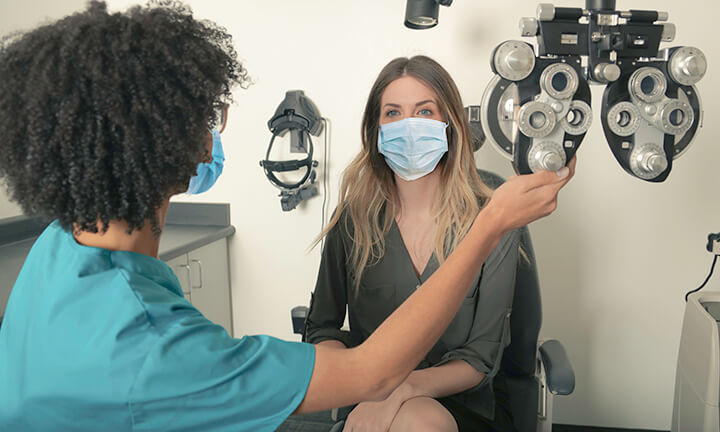
When it comes to correcting your eyesight, there’s a lot to consider. Not just because you want to see your best, but because you want to see your best with the greatest amount of comfort, convenience, and an aesthetic that best complements your facial features. Lenses in frames or contact lenses on your eyes? Or do you do away with lenses altogether through the exactitude of a laser surgery? We’ve got all you need to know to help you find the best option for your precious peepers.
Eyeglass frame of mind: Selecting the right frames for you
Eyeglasses are very individual, especially because they’ve come in and out of fashion multiple times throughout the history of pop culture, and because they undeniably alter your appearance. Not everyone appreciates that fact.
That said, based on your tastes and the assistance of a qualified glasses fitting technician, this change in appearance can be a welcomed enhancement of your look and style. But it’s important to consider the shape and size of your face and eyes, as well as their respective color hues. Of even more importance is the size and weight of the lenses you require, how they might fit into various frames and, ultimately, sit on your face. Consult with an optician to best combine your aesthetic preferences with an ideal fit.
Promising pros of eyeglasses:
- Last a long time if well cared for
- Durable, depending on their make
- Valuable lens enhancements like light reactive lenses (or traditional bi- and trifocal lenses), UV coatings, scratch resistance, anti-glare coatings, impact-resistance, etc.
- Many different shapes, materials, colors, and styles—including many frames from designer brands
- Contrary to popular belief, your glasses can help add class and sophistication to your look, or even help you make a bold and beautiful fashion statement
- Easy to use: 1.) Place on face; 2.) See better
- No hygiene risks
- Low maintenance—just need to occasionally wipe off the lenses and tighten the screws in the frame’s hinges
Considerable cons of eyeglasses
- Easy to lose and breakable (buy a case!)
- Fog up easily in a hot, steamy room, or from your breath in cold weather
- May need frequent adjustments from optician due to daily normal wear
- Less peripheral vision benefits
- Potentially bulky and/or uncomfortable
- Slide off your nose when you sweat
- Lenses can be easily scratched, depending on their material
- Glass lenses can shatter
- Not always ideal for physical activities
- Magnifying effect and glare of the lenses
Contact lenses: Choosing the right contacts for you
You’ve got a lot to gain from some well-fitted contact lenses. Choosing the right contacts for you is 100% contingent upon you having a properly fitted contact lens with the correct prescription, as determined by your eye doctor. Do not make assumptions about your eyes and your prescription, simply to order cheaper contact lenses online. This could lead to injuries and infections that cause long-term damage to your eyes and vision. Unlike glasses, contact lenses are considered a medical device and should be treated with care.
Promising pros of contact lenses:
- Wider range of peripheral vision correction
- No discomfort on the bridge of your nose or behind your ears
- Better for sports and physical activities
- Natural, unobstructed view of your face
- No glare or magnifying effect of the lenses
- Do not slide off of your face or move around, compromising the intended vision correction (especially while sweating)
- Generally, will stay in place directly over your corneas (so long as they’re fitted properly, and you have the correct prescription)
Considerable cons of contact lenses:
- Higher maintenance
- Require multiple accessories (cases, contact solution, additional supply of lenses, etc.)
- Require a hygiene routine to help minimize any risk of infection
- Need to be fitted to your specific eye shape and size—meaning an additional consultation with your eye doctor beyond determining the prescription
- Putting them in and out of your eyes take some getting used to
- Typically more expensive over a longer time period, since they need to be replaced frequently
LASIK: Laser. Eye. Surgery.
Three words that not many people would have predicted would be joined together in the 21st century.
Promising pros of Lasik:
- Permanent vision correction
- Consistent, high-quality vision improvement (more than 95% of people were satisfied with their vision following Lasik)
- Relatively low risk of injury, complications, or worsening of the vision problems
- Financing the surgery is usually a possibility over a period of 6 to 24 months
- Typically do not have to wear prescription lenses after the surgery
- Unlike many other vision insurance providers, VSP provides opportunities to reduce your out-of-pocket costs
Considerable cons of Lasik:
- Risks are low, but risks are severe should they occur
- Recovery time (a day or so of rest, then gradual adjustment to vision changes)
- Expensive
- Psychological burden of having a surgery
- Permanent changes if something should go wrong
- Not everybody is eligible for Lasik
- Considered by most vision insurance companies as an elective cosmetic surgery, meaning there are likely to be out-of-pocket costs
Finding a reputable Lasik center: While it can already be a bit disconcerting to think that someone is going to use a laser to change the shape of your eyes for better vision, it can also be overwhelming to find the Lasik center that’s up to the task and will treat your eyes with the utmost care. Mostly because there are so many of them out there.
First, you will require a prescreening from a certified professional. This is to ensure that your eyes are indeed suited for laser eye surgery. If your eyes have certain physical characteristics or abnormalities, then you may not be eligible. The laser, after all, can only cut away tissue to change the shape of your eyes. If your corneas are particularly thin, this could be a major risk to your eyes and vision. Many in-network VSP eye doctors are also certified laser vision care doctors and can do this prescreening for you. Otherwise, they’ll refer you to a trusted in-network colleague of theirs.
The next step is to find the laser vision center that will perform the surgery itself. VSP maintains a comprehensive list of these Lasik centers throughout the country, which are preapproved for their quality, credibility, and safety practices.
All that’s left to do now is to schedule an eye exam with your optometrist and discuss the options you think may be best for your eyes.
If you don’t have vision insurance, find out how VSP Vision Plans can help you save on your next eye exam or pair of glasses. To discover the best vision insurance, you don’t need to look further than VSP.
This article was reviewed by Dr. Gabriela Olivares from Ft. Lauderdale, FL. She shares regular information around eye health on her popular Instagram page.
Information received through VSP Vision Care's social media channels is for informational purposes only and does not constitute medical advice, medical recommendations, diagnosis, or treatment. Always seek the advice of your physician or other qualified health provider with any questions you may have regarding a medical condition.
Your vision. Your way.
Not covered for vision? Get an individual plan, customized for you – including where you want to use it: at the doctor, in a retail location, or even online.

It’s Clear You Need an Eye Exam: How to Know When to Go
Taking care of your eyes and vision health should be part of daily life, with an eye exam every year or so. But there are other reasons you might wa...

The 7 Serious Habits Hurting Your Eyes
“Don’t stare into the sun.” Hopefully that important piece of eye-safety advice stuck with you since childhood—looking into ...

Eye Allergies? Tips for Healthy Eyes
For those of us with allergies, the annual return to warmer weather doesn’t always put a spring in our step. Allergies affect over 19 million ...

